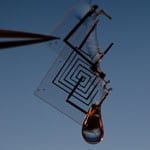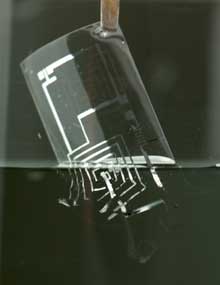 Implantable medical treatments are becoming more of a reality with recent advances in new class of biocompatible, dissolvable electronics. Such implantable devices might serve, for example, as a non-antibiotic, programmable bactericide that can dissolve harmlessly into the body to prevent surgical site infection.
Implantable medical treatments are becoming more of a reality with recent advances in new class of biocompatible, dissolvable electronics. Such implantable devices might serve, for example, as a non-antibiotic, programmable bactericide that can dissolve harmlessly into the body to prevent surgical site infection.
Researchers funded by the Defense Advanced Research Projects Agency (DARPA) have created the micro-electronic systems and components using ultrathin sheets of silicon and magnesium encapsulated in silk. The thickness and crystallinity of the silk determines how long the electronics take to dissolve: days, hours, or even minutes. Silicon and magnesium are naturally occurring at low levels in the human body, and since the amount of material used in these devices is below physiological levels, these electronics are biocompatible and eco-friendly.
“Transient electronics applied to localized antimicrobial therapy would be a major
advance,” said Alicia Jackson, DARPA program manager for this effort. “A limitation of
current implanted devices such as pacemakers and artificial joints is localized infection. Applying thin film appliqués to implant devices for localized surface heating and sterilization may help counter these infections, even when antibiotic resistant bacteria are present.”
The research team from the University of Illinois, Northwestern University in Illinois and Tufts University in Massachusetts recently published their findings in the September 28, 2012 issue of Science.
The chip can be controlled wirelessly, and the structure of the silk can be altered to control how long the device lasts before dissolving. The technology holds promise for a wide range of applications such as environmental monitoring and earth-friendly consumer electronics; but for now, researchers are focusing on medical applications.
Images courtesy of DARPA Public Affairs Office: Water dissolvable electronic components of a transient electronic device: transistors, diodes, inductors, capacitors and resistors, all on a thin silk substrate.

